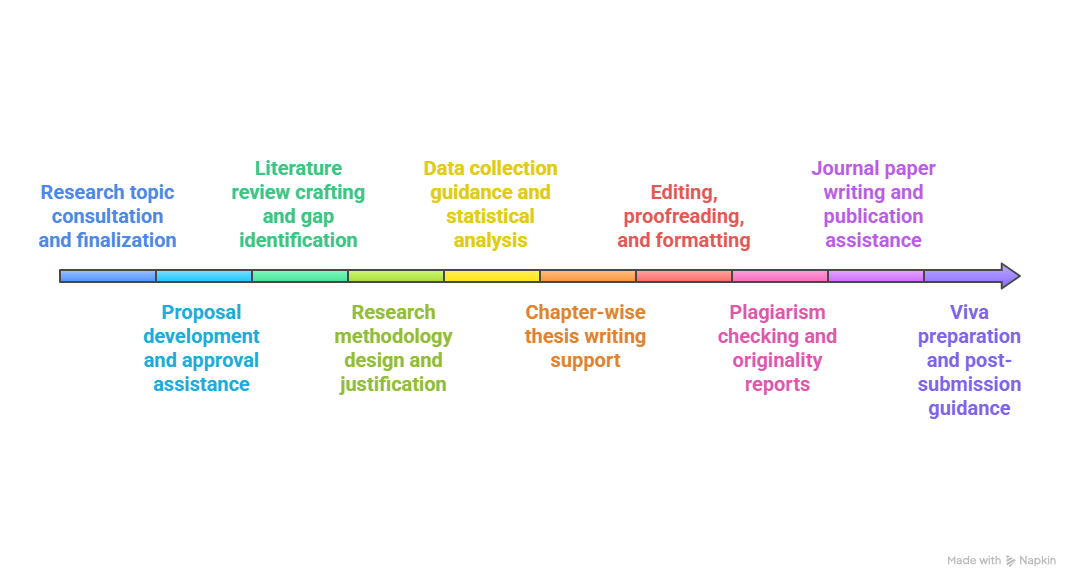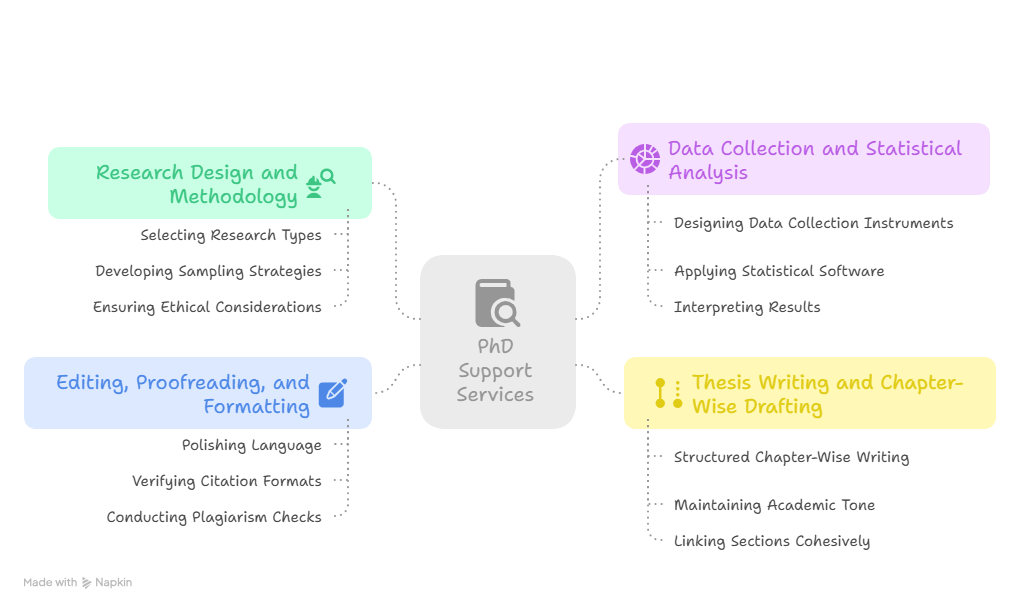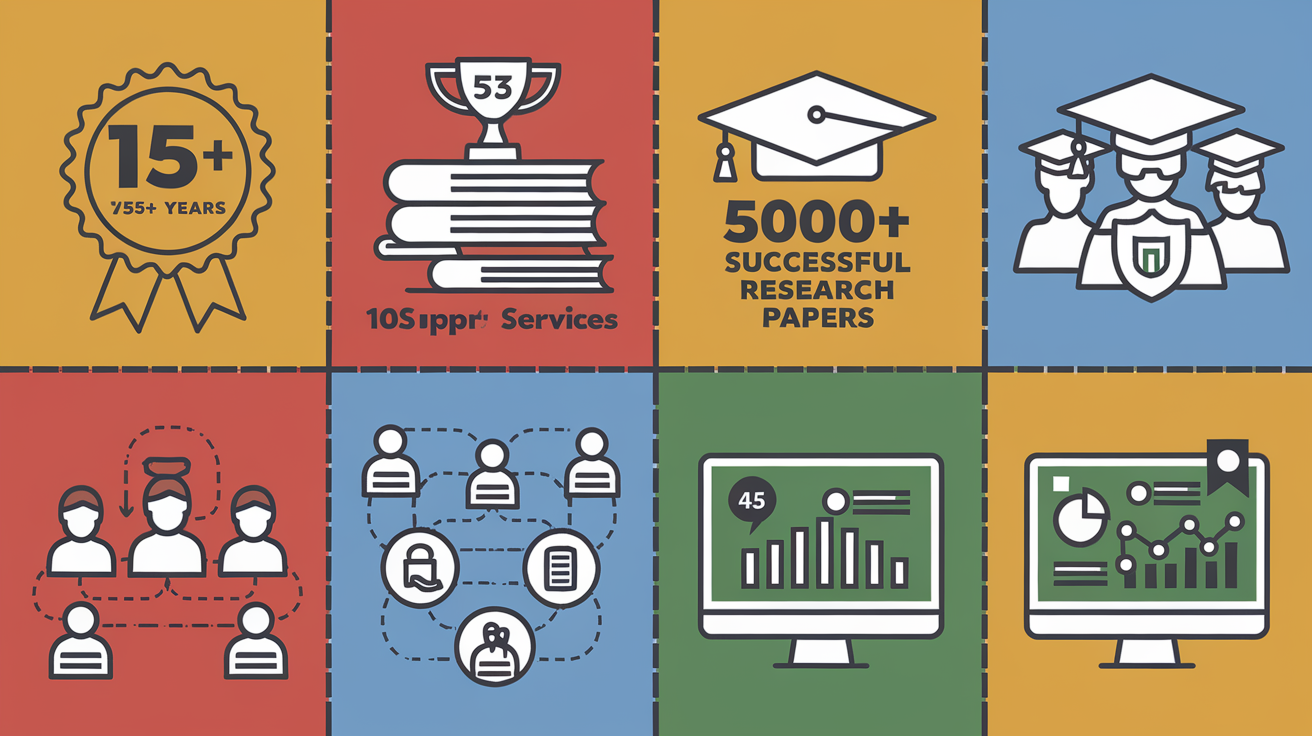Completing a PhD is one of the most demanding academic journeys, requiring rigorous research, meticulous writing, and adherence to strict academic standards. Many scholars face challenges that can impede their progress or affect the quality of their work. This is where PhD support services become invaluable. These services provide expert guidance and professional assistance throughout the doctoral research process, ensuring students can navigate complex requirements smoothly and achieve academic excellence.
In this blog, we will explore the essential components of PhD support services, why scholars need them, the various stages covered, and how PhDiZone stands out as a leading provider of PhD support services in India.
Table of Contents
PhD Support Services
PhD support services encompass a wide range of academic assistance designed specifically to help doctoral candidates complete their research projects efficiently and successfully. These services go beyond simple editing or writing help; they offer comprehensive support for each stage of the PhD journey — from selecting a research topic to preparing for the viva voce (oral defense).
PhD support services are provided by experienced academic professionals, subject matter experts, statisticians, and editors who understand university guidelines and research norms. The aim is to ensure the research is original, methodologically sound, well-documented, and meets all institutional requirements.
Typical offerings include
- Research topic consultation and finalization
- Proposal development and approval assistance
- Literature review crafting and gap identification
- Research methodology design and justification
- Data collection guidance and statistical analysis
- Chapter-wise thesis writing support
- Editing, proofreading, and formatting
- Plagiarism checking and originality reports
- Journal paper writing and publication assistance
- Viva preparation and post-submission guidance
Such end-to-end academic support empowers PhD scholars to focus on quality research while meeting deadlines and university standards.
Do Scholars Need PhD Support Services?
The path to completing a PhD is intellectually fulfilling yet often filled with obstacles that can be difficult for students to navigate. Here’s why many scholars rely on professional PhD support services:
1. Complex Academic Requirements
Doctoral research requires mastery of diverse skills — research design, academic writing, statistical methods, referencing styles, and more. Many students lack expertise in all these areas.
2. Time Constraints
Balancing research with teaching duties, jobs, or personal commitments can severely limit the time available for focused PhD work.
3. Research and Writing Skills Gap
Not all candidates have strong academic writing or data analysis skills. This can affect the clarity and impact of their thesis.
4. Pressure for Originality
Universities enforce strict plagiarism rules. Ensuring originality while maintaining scholarly rigor requires professional assistance.
5. Formatting and Submission Guidelines
Different institutions have varied formatting, citation, and structural rules that must be strictly followed to avoid rejection.
6. Need for Timely Completion
Delays in thesis submission can impact academic and career progression. PhD support services help manage timelines efficiently.
By accessing expert PhD support services, scholars gain the confidence, resources, and technical help they need to excel at each research phase, reducing stress and improving outcomes.
End-to-End Guidance: From Topic Selection to Viva
One of the core advantages of professional PhD support services is comprehensive assistance throughout the entire research lifecycle. The typical process includes:
- Topic Selection and Feasibility Assessment: Selecting a relevant, researchable, and impactful topic aligned with current academic trends and personal interests. Experts help evaluate the feasibility and scope of research ideas.
- Research Proposal Preparation: Drafting a detailed proposal that outlines the research objectives, methodology, literature base, and expected contributions. This proposal serves as the foundational plan guiding the entire thesis.
- Literature Review and Gap Identification: Conducting an exhaustive review of existing studies to identify knowledge gaps and justify the research’s necessity.
- Research Design and Methodology: Choosing suitable qualitative, quantitative, or mixed research methods and designing data collection instruments or experiments.
- Data Collection and Statistical Analysis: Guidance on gathering primary or secondary data, data cleaning, and application of appropriate statistical tools for analysis.
- Thesis Writing: Support in writing each chapter systematically—introduction, methodology, results, discussion, conclusion—ensuring coherence and academic tone.
- Editing and Formatting: Meticulous proofreading, editing, and formatting aligned with institutional guidelines to prepare a submission-ready thesis.
- Publication and Viva Preparation: Assistance in converting thesis findings into publishable journal articles and preparing for the oral defense through mock sessions and question-answer practice.
This structured support helps scholars navigate the complex and demanding process of doctoral research effectively.
Research Proposal Writing Support
The research proposal is a critical document that sets the foundation for your PhD thesis. It demonstrates the research question’s significance, proposed methods, and expected outcomes. However, writing a compelling proposal is often challenging.
- Defining Clear and Concise Research Objectives
PhD support services help you articulate specific and focused objectives for your research. Clear objectives provide direction and ensure your study stays on track. - Framing Research Questions or Hypotheses
Crafting well-defined research questions or hypotheses is crucial. Experts assist in formulating these so they are precise, measurable, and relevant to your field. - Crafting a Comprehensive Literature Review
A strong proposal includes a thorough review of existing studies. Support services help you gather, analyze, and summarize relevant research, highlighting gaps your study aims to fill. - Designing Robust Methodology with Justification
Choosing the right methods for data collection and analysis is essential. Professionals guide you in selecting qualitative, quantitative, or mixed methods, with clear reasoning for your choices. - Developing a Realistic Timeline and Work Plan
Effective planning improves project management. Support includes creating a feasible timeline that breaks your research into manageable phases, helping you meet deadlines. - Writing a Persuasive Narrative that Aligns with University Expectations
Presenting your proposal in a clear, coherent, and convincing manner is key to approval. Experts help craft your narrative to meet academic standards and effectively communicate your research plan.
With professional proposal writing support, scholars improve their chances of swift approval and a strong research direction.
Literature Review & Gap Analysis
A strong literature review is essential for contextualizing your research and highlighting gaps your study aims to address. Many students struggle to synthesize large volumes of academic work into a coherent review.
- Conducting Systematic Searches of Academic Databases
Experts perform thorough searches across trusted academic databases to collect all relevant and recent research related to your topic. - Selecting Credible and Relevant Sources
They filter out low-quality or irrelevant papers, focusing only on authoritative studies that strengthen your literature review. - Summarizing, Synthesizing, and Critically Analyzing Existing Research
Support services help distill complex findings into clear summaries, link different studies together, and evaluate the strengths and weaknesses of existing work. - Identifying Clear Gaps or Unresolved Questions in the Literature
They pinpoint areas where current research is lacking or questions remain unanswered, highlighting the unique contribution your study can make. - Organizing the Review Logically to Support Research Rationale
The literature review is structured in a coherent, thematic, or chronological order that clearly builds the case for your research objectives.
This comprehensive literature review ensures your thesis stands on a solid academic foundation.
Research Design and Methodology Assistance
Choosing the right research design and methodology is vital to generate valid and reliable findings. Whether using qualitative interviews, quantitative surveys, or mixed approaches, clarity and justification are necessary.
PhD support services offer guidance on:
- Selecting research types that best address your questions
- Developing sampling strategies and data collection techniques
- Constructing surveys, interview guides, or experiments
- Ensuring ethical considerations and approvals
- Outlining analytical methods such as regression, ANOVA, thematic analysis, etc.
This assistance ensures your methodology chapter is thorough, transparent, and aligned with academic standards.
Data Collection and Statistical Analysis
Managing data collection and analysis is often time-consuming and requires technical skills. PhD support services assist with:
- Designing data collection instruments and protocols
- Advising on primary or secondary data sourcing
- Data entry, cleaning, and validation techniques
- Applying statistical software like SPSS, R, MATLAB, or Python for analysis
- Interpreting results and presenting them effectively through tables, charts, and graphs
This technical support improves the accuracy and depth of your research findings.
Thesis Writing and Chapter-Wise Drafting
Writing a thesis involves compiling complex research into a clear and scholarly narrative. Many candidates find this overwhelming.
PhD support services provide:
- Structured chapter-wise writing assistance—Introduction, Literature Review, Methodology, Results, Discussion, Conclusion
- Maintaining academic tone, clarity, and logical flow
- Crafting well-argued and evidence-backed content
- Linking sections cohesively to tell a compelling research story
Editing, Proofreading, and Formatting Services
Editing, proofreading, and formatting are crucial steps to make your thesis polished and submission-ready. High-quality editing focuses on fixing grammar mistakes, punctuation errors, and improving the clarity and overall writing style. This ensures your research is communicated clearly and professionally.
Professional PhD support services offer several key benefits in this phase:
-
They polish the language by correcting syntax errors, making sure sentences flow well and ideas are expressed precisely.
-
They enhance the academic tone to maintain consistency throughout your thesis, ensuring it sounds formal and scholarly.
-
They verify citation formats such as APA, MLA, Harvard, or IEEE to make sure your references follow your university’s guidelines perfectly.
-
They adjust the formatting elements like margins, font sizes, headings, and tables so your document meets all institutional requirements.
-
They conduct thorough plagiarism checks using trusted software, providing originality reports to confirm your thesis is authentic and free from duplication.
By utilizing professional editing, proofreading, and formatting services, you can confidently submit a thesis that is not only error-free but also meets all academic standards required by your university.











